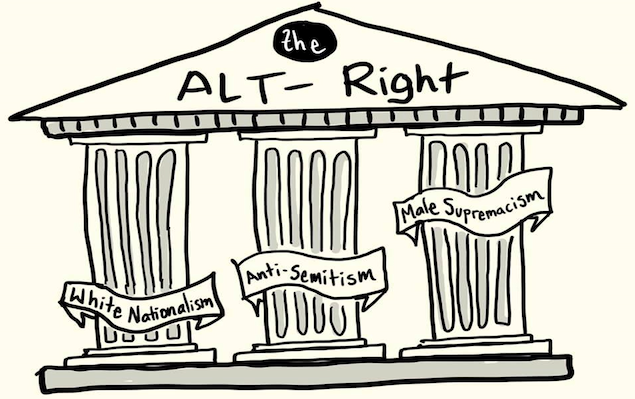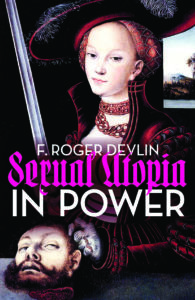Male Supremacism in the United States?
Posted By Margot Metroland On In North American New Right | Comments DisabledMale Supremacism in the United States:
From Patriarchal Traditionalism to Misogynist Incels and the Alt-Right
Series: Routledge Studies in Fascism and the Far Right
Emily K. Carian, Alex DiBranco, Chelsea Ebin (Editors)
Abingdon (Oxon) & New York: Routledge, 2022
Despite its beguiling title and subtitle, I am sorry to report that this new book from Routledge Studies in Fascism and the Far Right is a very sloppy doggy’s dinner. A collection of essays and quasi-academic articles from the past decade, Male Supremacism in the United States throws together old scraps and rants in an effort to support its thesis that there is a movement of “male supremacism” that overlaps with, and indeed is a gateway to, “white supremacism.”
I suppose this is meant to mirror the concept of “intersectional feminism,” the belief that upper-middle-class American women need to share ideological grievances with oppressed females of all races and species, particularly Women of Color in the Third World. It all sounds like a confused and tendentious thesis to begin with, and so it is. The essays collected here don’t even try to make the case that “male supremacism” or “white supremacism” really exist — I mean, apart from being Leftist swear words against normality and traditional virtues.
Nevertheless, there are eye-openers and funny bits mixed in among the sometimes awfully tedious prose. Did you know there was an Institute for Research on Male Supremacism? There is, or at least there is a website [2] that asks for donations. This notional institute is the fountainhead of this book, and its founders are the editors listed above. A year or so ago they described their upcoming, as-yet unnamed volume, with these murky words:
Drawing on a variety of data from many different male supremacist movements (such as “Incels”, “The Red Pill”, the “Men’s Rights Movement” and “Men Going Their Own Way”) the researchers seek to provide a comprehensive resource for future research on male supremacism, while also exploring the ideology’s importance to the Alt-Right’s recent political mobilization.
 [3]
[3]From the “Institute for Research on Male Supremacism [2]” website
“The Alt-Right’s recent political mobilization.” I said there were funny bits, and this is a major one. Here are these founders/editors, in 2021 or 2020, imagining that the “Alt-Right” is still a thing — in fact a hot new thing!
And so their newly published book (April 2022) takes us on a long trip down memory lane, back to those thrilling days of 2014 or thereabouts. The days of GamerGate and incels and MGTOW and NEETs![1] [4] Of Milo Yiannopoulos writing for Breitbart News! Of 4chan and cucks and Pick-Up Artists! The manosphere and “game” and Matt Forney! And even Roosh V with his old Return of Kings website — here referenced and hyperlinked. (Only trouble is, the link is dead, or at least doesn’t take you to the referenced article. This is true of most URLs in the book’s endnotes, bibliography, and index.) Here’s Jack Donovan, and there’s Richard Spencer, mentioned seven times. Counter-Currents gets a look-in, too, mainly for Greg Johnson’s essays “The Woman Question in White Nationalism [5]” and “Abortion & White Nationalism [6].” There’s also James J. O’Meara, whose Männerbund theories are cited by Ann Sterzinger in her review of Green Nazis in Space! [7].
The authors’ implied argument is that since these far-flung people and positions often seemed ripe with misogyny and anti-feminism, and some of them also relished frank discussion of racial matters, therefore they provided an easy entry to hardcore “white supremacism.” This is really a stretch, and overlooks a couple of obvious facts. One is that there was little stigma or downside in voicing strong opinions on GamerGate or toxic feminism. These were things one could talk about in barrooms and classrooms, regardless of your age or sex, without being tagged as a fearsome nazi. They were accepted as legitimate topics of discussion (at least in 2014).
A more obvious objection is that many if not most women share these basic attitudes even if they’re not hunkering down with the gameboys. That’s a sore point with the latter-day feminist Left, who like to pretend they ride point on female solidarity, and readily characterize women outside their cult as “bootlickers” or “handmaidens.” The latter expression comes from the current TV version of The Handmaid’s Tale, and suggests high-caste women who support and sympathize with conservative men on social issues. This is equated with being “submissive” because, you know, women have no agency.
Accordingly, the book spends a long chapter attempting to take down the most effective opponent of feminism’s toxic wing, the glossy housewife-lobbyist-lawyer Phyllis Schlafly [8] of Alton, Illinois. Schlafly (1924-2016) continues to be a target because she was a much more successful and presentable woman than her Leftist opponents. That irony provided much of the implicit humor in the 2020 miniseries Mrs. America, in which Schlafly was played by the regal Cate Blanchett and her foes were mainly depicted as neurotic, toad-like mutants. As the years go by it also becomes evident that Schlafly’s social and political analysis far surpassed that of her contemporaries. She saw that the long-term goals of feminism were not merely no-fault licentiousness, abortions, and state-run daycare centers, but a usurping of all male privileges while holding tight to their special female privileges as well.
The author of this chapter is grudgingly impressed with Schlafly, though she sees her “submissiveness” to “the patriarchy” as hypocritical because Schlafly herself was not a meek, stay-at-home housewife. There’s no hypocrisy or irony here. The writer apparently doesn’t know much about upper-middle-class American women. Schlafly was in many ways typical of her peers, with an active life in clubs and volunteer work.
But what really burns the author’s biscuits is Schlafly’s relentless mockery of feminist cant:
Feminism, not patriarchy, was accused of being responsible for women’s misery. Schlafly continued, “If you believe you can never succeed because you are a helpless victim of mean men, you are probably correct.” This type of ridicule of feminist denunciation of men’s domination appeared often in her publications.
The writer is also annoyed by Schlafly’s persistent invocation of Christian ethics and iconography. Schlafly’s Catholicism and veneration of Mary is here spun as somehow exotic for her time and place, which it certainly was not.[2] [9]
 [10]
[10]You Can buy F. Roger Devlin’s Sexual Utopia in Power here. [11]
The other figure in the book who gets extended biographical treatment is Gavin McInnes, onetime hipster guru, broadcaster, and founder of Vice, though more notorious in recent years for founding the Proud Boys, a club of young men who wore Fred Perry polo shirts, drank beer, and sometimes sought out street affrays. As with the coverage of Phyllis Schlafly, the author here is awestruck by the figure of Gavin because he’s not some squirrelly political activist but rather a famous satirist and provocateur. An attempt is made to frame the uxorious McInnes (wife, three kids) as a misogynist, because a good part of his shtick has been to riff on the obvious differences between men and women. (Examples: Women earn less because “they’re less ambitious” because “that’s God’s way!” “You’re not a man unless you have beaten the shit out of someone.”)
Because McInnes specializes in over-the-top satire and ritually denounces overt racialism, it’s very hard to portray him as a hatemonger, but the author does try hard, and adds a lot of inadvertent humor to Gavin’s own. She characterizes the Proud Boys as “a far-right group that only allows cisgender men to join,” a formulation worthy of Gavin himself. Funnier still is that she keeps griping about this, yet never looks into whether Proud Boy applicants were actually vetted on this crucial detail.[3] [12]
At one point McInnes became a Catholic, and reportedly joined the Knights of Columbus. The author of this chapter, a young woman in Dublin, is surprisingly ignorant of that institution, and evidently supposes it to be something like the fabled Knights of the Ku Klux Klan. She describes the K of C as a “right-wing Catholic group” that has “ties to fundamentalist right-wing think tanks.” (Aye, the auld Papist-Fundie alliance!) Typically, but less fatally, she says McInnes was born in Glasgow, when he was really born in Hitchin, Hertfordshire, a bit north of London, then raised mostly in Canada.
As though to balance McInnes’ clowning and hyperbole, the book concludes with an angry screed by a “trans Latina” calling herself Katherine Cross. Cross has nothing to say about the intersectionality of male supreemers and white supreemers (this piece is from a speech way back in 2013), but does let us know she is very angry about many things: angry because strangers often assume her to be a prostitute, or at least available for sex and mansplaining and oppression. This can’t be blamed on the uterus she doesn’t have, she tells us, inscrutably; rather it’s because of the patriarchy: “No uterus required, just patriarchy.” In fact, she says this four times. Among other outrages she shares with us, there’s her claim that the New York City police could legally “raid the handbags of trans women of colour [sic] and then arrest them on charges of prostitution if they’re found to be carrying condoms.” What she’s really referring to is black drag-queen prostitutes who make a loud fuss in neighborhoods outside their usual cruising venues. It’s true the New York police often concoct outlandish pretexts for making arrests; however, this one is hardly a sin that cries out to Heaven for vengeance.
This comic rant is an odd way to end this jumble-sale of a book. If the book’s thesis seemed tendentious to begin with, the finale suggests that the editors didn’t take the whole thing very seriously, either.
* * *
Routledge books are usually nicely designed and produced, even if they’re politically slanted and enormously overpriced. Presumably most sales are university library accessions. The paperback is priced at $45; the “hardback,” $160. I’ve mentioned the dead-URL problem, which is just sloppiness. It makes no sense to give a highlighted reference source if the thing doesn’t work. And little effort was put into the red-and-white cover design, a kind of reverse-Japanese flag motif. (Or were they really thinking of the Third Reich?)
The title of the book is likewise unfortunate. The use of the prefix style “United States” makes it sound as though it’s a study of a secret male-supreemist network in the federal government. They should have called it Male Supremacism in America: stately yet whimsical, with the obvious nod to Alexis de Tocqueville.
But Routledge’s loss is our gain. Perhaps we’ll hold that thought and come up with a light comic novel. Male Supreemism in America. Why, the book writes itself!
* * *
Like all journals of dissident ideas, Counter-Currents depends on the support of readers like you. Help us compete with the censors of the Left and the violent accelerationists of the Right with a donation today. (The easiest way to help is with an e-check donation. All you need is your checkbook.)
Due to an ongoing cyber attack [13] from those who disagree with our political discourse, our Green Money echeck services are temporarily down. We are working to get it restored as soon as possible. In the meantime, we welcome your orders and gifts via:
- Entropy: click here [14] and select “send paid chat” (please add 15% to cover credit card processing fees)
- Check, Cash, or Money Order to Counter-Currents Publishing, PO Box 22638, San Francisco, CA 94122
- Contact [email protected] [15] for bank transfer information
Thank you for your support!
For other ways to donate, click here [16].
Notes
[1] [17] I really ought to gloss these terms of yesteryear. GamerGate was a protracted online shouting match between male videogamers and a female “media critic” who claimed videogames were male-oriented and misogynistic. Incels were “involuntary celibates,” generally angry young men who live online and can’t get a girlfriend. MGTOW, Men Going Their Own Way, were an online community of men seeking to live without women, because feminism had made modern women degenerate. A NEET is generally a young man who’s not in school or employment. (Not in Education, Employment, or Training.) In 2014 he was the stock caricature who lived in his mom’s basement and consumed Hot Pockets.
[2] [18] There’s a very poor grasp of American religious history throughout the book. The authors believe there was historically a “White Anglo-Saxon Protestant (WASP) nativism” which still “fuels conservative Christian ideology on appropriate gender roles.” But WASP is a twentieth-century term describing upper-class old-stock Eastern elites, not non-Catholic white Christians in general, and certainly not the Bible-thumping fundies and evangelicals the authors have in mind. American “nativism,” as exemplified in the Native American and “Know Nothing” parties of the 1840s-1850s, was not founded by sectarian-driven Protestants. It was spearheaded mainly by a Jew, the sometime Congressman Lewis Levin.
[3] [19] Fortuitously I was at a dinner with Gavin McInnes the night before his inaugural Proud Boys meeting in July 2016. He was announcing his new club, and I asked what the criteria were for membership. “Members have to have, or once have had, a foreskin.” This neatly answered a multitude of questions; the Jews at the table purred their approval.
